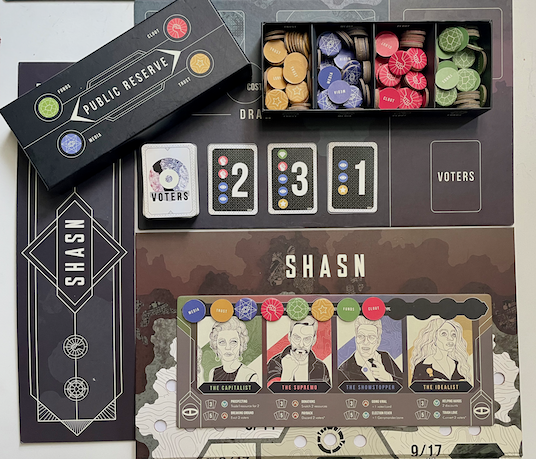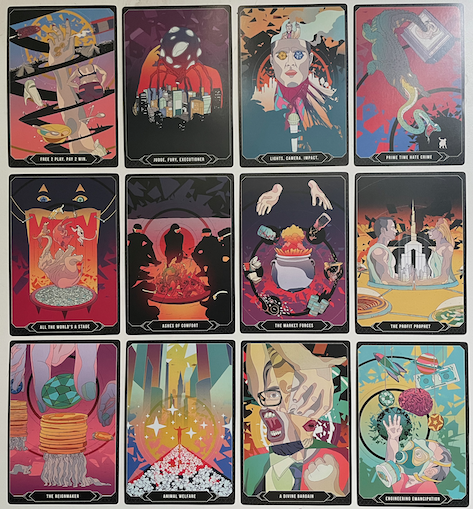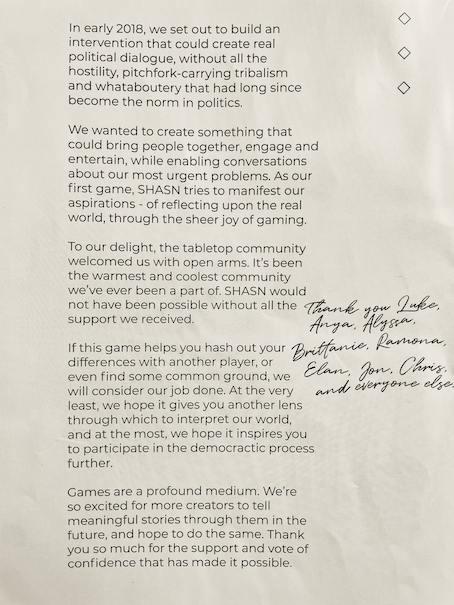SHASN
Webcomic by @sanitarypanels
Politics is one of the few tools that can significantly impact the lives of a large population in a relatively short time. In a democracy, each individual has a role to play in this process. However, many of us remain unaware of this important responsibility for much of our lives.
Imagine a scenario where you hold the ends of two ropes, labelled A and B. One end of rope A runs through a series of pulleys that operate a hand pump, drawing water from a well to quench the thirst of villagers. In contrast, the other end of rope B goes through a different set of pulleys that activate a hand saw, cutting down a tree that would fall on the hut of a daily wage labourer, thereby forcibly uprooting their life.
If you were asked, as a duty towards your country, to pull one of these ropes, which one would you choose? In this case, making the right choice—most likely A—is simple because you can see the consequences of your actions.
In reality, when it comes to voting, most of us tend to choose option B. This is understandable, as it is not easy to fully grasp the series of pulleys of the real world, i.e the complex mechanisms of society, government, policy-making and power. A typical voter might believe they have pressed the button towards "development." Still, they may not realise that this "development" could mean clearing forests and uprooting thousands of innocent citizens from their homes. Many people could lose their homes and livelihoods, and some might even lose their lives as a result. Moreover, if the government implements policies that limit the media or encourages crony capitalists to acquire them, the average voter may remain completely unaware that their choices contribute to the suffering or death of fellow citizens.
From the perspective of politicians and bureaucrats, they often face numerous challenges in implementing well-intentioned policies because they may encounter opposition from groups seeking to assert their power or from those who lack understanding.
The result is that citizens who pressed button A end up blaming the other group for the chaos, and vice versa, making it easier for governments to take advantage of this divide and continue exploiting innocent citizens for their benefit.
I have attempted to engage in discussions about governance with friends and relatives, both in person and on WhatsApp. However, these conversations quickly escalate into heated debates, as no one is open to considering alternative perspectives. Instead, each person just wants the others to adopt their viewpoint. Unfortunately, by the end of these debates, no new insights are gained, and the divide only grows deeper. This leads many to avoid such discussions altogether in order to preserve their sanity.
In 2019, I found myself in a contemplative phase, questioning whether dialogue is even possible in our polarised times. That's when I came across a Kickstarter campaign launched by Zain Memon, co-founder of Memesys Studio. Zain had created SHASN - The political strategy board game, and was seeking backers. The campaign stated,
“SHASN is an engaging board game that combines politics, ethics, and strategy. Players take on the roles of politicians competing in a national election, making tough policy decisions, influencing voters, and outmaneuvering opponents to secure political power.”
This concept intrigued me, especially when I saw that they reached their funding goal of 100% in less than 24 hours! I had been a fan of Anand Gandhi ever since I first learned about him with his film, Ship of Theseus. When I discovered he was the producer of the game, it was an easy decision for me to become a backer. I felt lucky to be among the 4,208 supporters of this project, excited to receive the Collector’s Edition of the game once it was ready.
Due to COVID-19, there were delays in shipment, and after eagerly waiting for 18 months, the game finally arrived.
SHASN - Collectors Edition
SHASN - Unboxed. INDIA 2019-2020 Campaign
HOW TO PLAY*
SHASN is a 2-5 player game where the objective is to win an election.
Each player gets a Player Mat and The Playbook for reference.
The board has 9 zones. The game ends when all possible majorities in all the zones have been formed. The player with the highest number of majority voters wins the game.
Game Board showing 9 zones. Elections are held in all the zones.
Players form a majority in a zone by influencing more than half the voters in that zone.
A zone with a majority being established.
Voters can be influenced through Voter Cards. Each Voter Card has a combination of resources on it. Pay these resources to the Public Reserve (the resource bank) to influence that many voters and place them on the board. There are 4 resources in SHASN - Campaign Funds, Street Clout, Media Attention, and Public Trust. Players earn and trade resources to influence Voter Cards.
Influencing voters by paying resources to public reserve.
Resources are earned from answering Ideology Cards. At the start of each turn, the player on your right will read aloud both sides of the top Ideology Card for you. Ideology Cards pose important policy questions. You will have to pick between the two available answers on each card. Every answer will yield a different set of resources. In SHASN, both answers on an Ideology Card belong to a different Ideologue.
Ideology Cards
There are 4 Ideologues - The Capitalist, The Supremo, The Showstopper, and the Idealist. As you collect multiple cards belonging to these Ideologues, you will unlock exciting powers.
A player gains Gerrymandering Rights in a zone by having the most voters there. This allows you to Gerrymander (move) one non-majority voter in or out of that zone, or in between two adjacent zones, every turn. It’s an important strategy to slow opponents down by dispersing their voters! There are 11 Volatile Areas across the board. If your voter is placed in a Volatile Area, a Headline is triggered. At the end of the ongoing turn, draw the top Headline Card and resolve it. Headline Cards contain an array of lucrative opportunities and devastating penalties. There are Conspiracy cards at your disposal that offer a wide range of boosts and attacks.
Headline and Conspiracy Cards
As mentioned before, the game ends when all possible majorities in all the zones have been formed. The player with the highest number of majority voters wins the game.
*The text in this section is copied from SHASN’s COLLECTORS EDITION RULEBOOK.
Eager to play the first game, I invited my friends over, who were keen to give it a try. I read the Rulebook while I was waiting for them to arrive. Reading the Rulebook was an experience in itself. The first thing that caught my attention was the title on the first page: "HOW TO READ THIS RULEBOOK!"
The presentation was impressive, with easy-to-navigate chapters that combined a narrative introduction with a detailed list of rules for each mechanic. This approach made the learning process feel less daunting. The use of different fonts and illustrations helped to highlight key concepts, while the overall colour scheme was visually appealing. Additionally, there were tips and suggestions throughout, along with a designer's note that explained the motivation behind certain concepts and the overall design. This made understanding the game an engaging experience.
When my friends arrived, we jumped into our first game.
First game with Uday, Apurv and Devesh in Melbourne.
As newcomers to the game, we found ourselves referring to the Rulebook almost every turn. It was amusing to see how each of us interpreted the literature on the cards differently. Whenever a policy question was posed to a player, the rest of us couldn't help but laugh at the expression on their face as they struggled to choose between adhering to Ideals and seizing an opportunity for power. We fought hard during the elections, engaging in debates, discussions, negotiations, appeasement, coalition-building, and even backstabbing. In the end, a winner emerged. Uday, who is arguably the smartest among us, won the elections. Now it was time to read the Cost of Victory card.
The Cost of Victory Cards is my favourite part of the game. There are 12 Cost of Victory Cards, each corresponding to a unique combination of primary and secondary ideology. They offer a glimpse into the world that your ideological beliefs might create. The winner has to select the card that applies to him/her and read it around for all players to hear.
Cost of Victory Cards.
Uday, the player with the purple mat, had emerged as the winner. Based on his responses to the policy questions, he possessed cards from all the different ideologies. However, his primary ideology, represented by the highest number of cards, was The Idealist, while his secondary ideology, with the second highest number of cards, was The Capitalist. He then read his card.
Even after completing the game, our discussions about it continued. We were astonished by the depth of information packed into the artifacts in the form of literature and intricate artwork. The mechanics of the game closely simulated real-world scenarios, providing us with valuable insights into the complexities of governance and policy-making. It highlighted that campaigning in elections is not an easy task.
I initially played the game with friends who share similar ideologies, which made our experience quite smooth. However, my motivation for buying the game was to play with people who have different ideologies. Over the next few years, I played the game with a variety of individuals, some with similar beliefs and others with differing ones.





I cannot speak for others, but playing this game with people from different age groups and varying worldviews has been an enriching experience for me. It has helped me let go of some of my judgments and be more open to those who see the world differently. Most importantly, it rekindled the joy of gathering in a circle, making time for one another, and sharing laughter with loved ones.
Thank you, Zain Memon, Anand Gandhi, and the entire incredible team behind SHASN! Your hard work and creativity have truly brought something special to life!
Note from the creators of SHASN

















